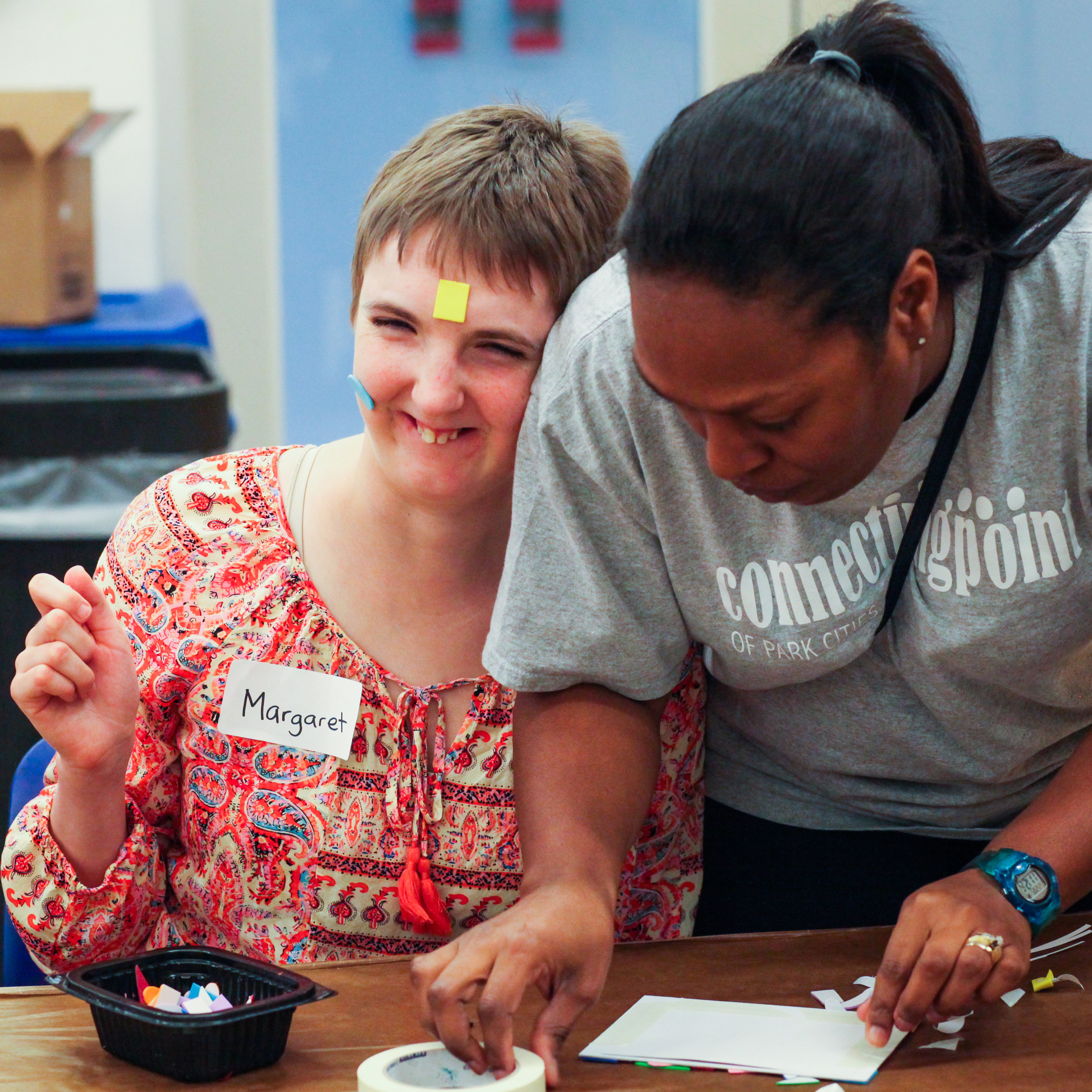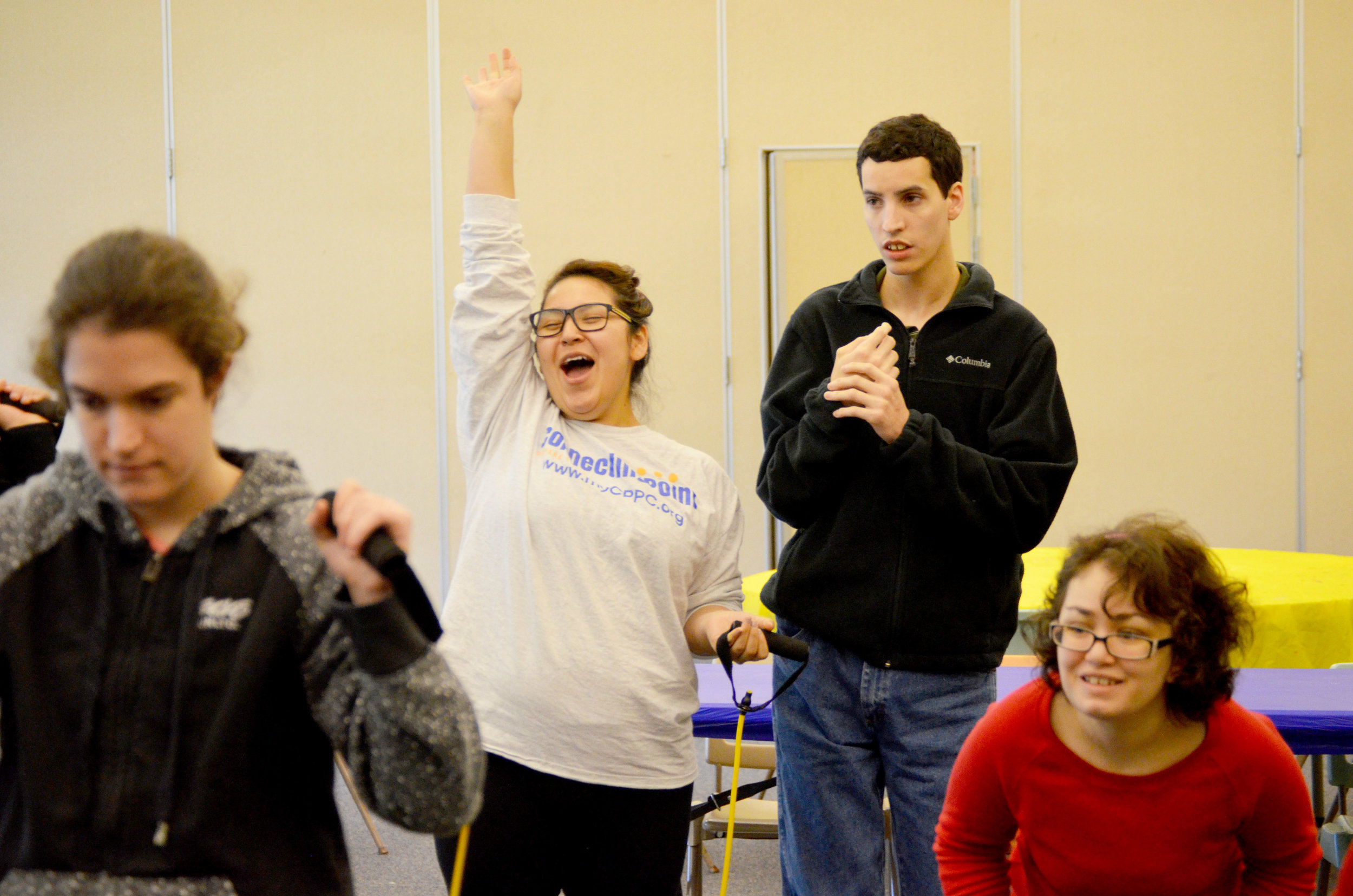Interview by Mary Martin. Photos by Jan Osborn and Connecting Point of Park Cities.
Today we are sharing an interview with Cynthia K. Olson, the new Executive Director at Connecting Point of Park Cities (CPPC). CPPC is celebrating five years of providing a safe and inclusive day program for adults with disabilities. Their team is focused on fostering independence through impactful educational, social, recreational, and vocational initiatives.
Tell us a little bit about your career journey, and how you ended up choosing the nonprofit sector as your focus.
The nonprofit sector is the second half of my career. The first was spent with McDonald’s Corporation. I began working for an owner/operator, then joined McDonald’s Corporate working for the Dallas Regional office. Over my tenure I worked in marketing, advertising, and public relations. Eventually, I went into operations management, opened new stores, and helped build our relationship with Walmart and Home Depot.
One evening I was sitting in the parking lot of our church working on sales reports when a ministry leader knocked on my car window asking me to help his wife prepare dinner for individuals experiencing homelessness worshiping with us that afternoon. I did, and I was hooked. Over the next five years, I volunteered weekly, and began to pray for an opportunity to serve full-time. The Salvation Army, (TSA) here in Dallas gave me the opportunity to join their Marketing and Communications department, during my time with them, I held a variety of positions giving me an invaluable foundation to build on. Since leaving TSA I have enjoyed time working with Best Buddies, International and Austin Street Center.

What was it like growing up in your family? How did your parents and siblings influence your desire to help others?
When my mom and dad brought home our baby brother, they were both surprised and totally unprepared to raise a child with Down’s syndrome. Aaron was born when a child’s placement in a state school was the norm.
Fortunately my parents resisted this solution, and set about to meet Aaron’s needs in our home. Both mom and dad served on the founding board of Loving Care, a small private school which served to not only help with student development, but to educate parents and the community in the then new notion of inclusion. Ultimately mom applied her elementary education degree to direct Angels, Inc. a private school for children with intellectual diabilities in East Dallas, and teach in Special Ed in DISD.
Mom and dad’s example had tremendous influence on me. My first volunteer position was serving as a camp counselor for children with special needs, my first job was as a Special Ed classroom assistant.
Today, Aaron lives in a group home in Arlington, Texas that is owned and managed by a family friend!
How has working for organizations that serve marginalized populations changed your perspective on our community?
It’s cliché, but authentic. Daily I am made aware of how fortunate I am. I have choices on where and how I live, and with whom. I am able to choose what I want to eat, wear, the temperature in the room. I can pursue most any interest I chose. Ease of communication, broad mobility, choices, privacy, these basics and more are difficult for, or unavailable to men and women with disabilities.
The language around disabilities seems like it has shifted quite a bit in the last ten years. What benefits have you seen as more people are aware of language that includes and values people with disabilities?
The increase of awareness in our language has elevated our overall awareness of men and women with disabilities. This shift in how we speak of individuals with disabilities causes us to first acknowledge their humanity, then their disability. My brother Aaron is not Down’s syndrome, he has Down’s syndrome. Aaron was born during a time that Down’s Syndrome was frequently referred to as Mongoloid, not in a derisive manner, but as an identifying noun. Using this type of language objectifies a person and fails to honor them as individuals.
What are some ways that you think Dallas could be a better place for people who live with Intellectual Disabilities and their families?
There is always a need for community. We practice inclusion, but do we offer community?

Can you share your favorite place to spend time and relax in Texas?
Some of my favorite spots are in New Braunfels, Gruene, San Marcos, Austin—floating or kayaking the Guadalupe or Comal rivers, visiting with family and friends, and enjoying live music, tex-mex and barbecue!
How can people get involved at Connecting Point of Park Cities?
Come see us! On Wednesday September 18th from 11:00 a.m. to 1:00 p.m. at 4711 Westside Drive we are holding an open house to celebrate our 5th anniversary.
We also need volunteers who can commit to some training to accompany our teammates when we are out in the community on Tuesdays and Thursdays.
And follow us on social media! Sharing our posts is a simple but impactful way to help us build awareness.
If you know someone who is Doing Good in Dallas, we’d love to hear about it! Share their story with us.
